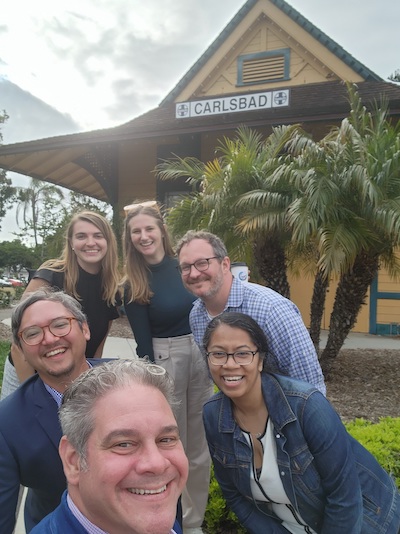We sat down with David Graham, chief innovation officer in Silver-Certified Carlsbad, CA, to chat about why he decided to take the Assessment (and why other cities should too).
David Graham of Carlsbad, CA, holds two important honors in the What Works Cities community. First, he spearheaded Carlsbad’s Certification efforts, which led the city to achieving Silver Certification in June. Second, he is the first and only person to include GIFs in Assessment documentation.
David is a trailblazer in more than just GIFs: when he joined the City of Carlsbad as the first Chief Innovation Officer in the San Diego region in 2018, the beachfront city of 115,000 people did not have a dedicated data team or data roadmap. In 2020, Carlsbad adopted a vision for civic innovation that included a citywide performance management, data governance and management plan.
David says that vision acknowledged the importance of the What Works Cities Certification and referenced its standards. As Deputy Chief Operating Officer in the City of San Diego, David was a senior leader when San Diego achieved a Silver Certification in 2020. He has seen the impact of the Certification through his global work with Harvard TECH and as an ambassador for making cities better. “I’ve been connected with cities that have gotten Certified since the program’s inception so I believed in its value and I knew that we could accelerate Carlsbad’s strategic innovation and operational excellence efforts while demonstrating that cities of any size should go all-in on data-driven government,” he said.
With a roadmap in place, getting executive buy-in for Certification was straightforward. Additionally, David leaned on the experience and credibility of Bloomberg Philanthropies and Results for America. “In Carlsbad, the pursuit of continuous improvement and data-driven governance isn’t just policy; it’s passion. When the benchmarking idea was introduced with the known reputation of Bloomberg Philanthropies and Results for America, the answer was: Go do it and be amazing.”
He did.
David and Senior Program Manager Rachel Maltz submitted the Assessment in 2022. Completing the Assessment results in a comprehensive look at your city’s data practices—after all, being a data-driven local government requires sustainable and robust data practices across city hall. The Assessment measures 43 criteria that fall under eight foundational practices. “If you dedicate the time, effort and resources just to doing the Assessment, you will discover and improve your city through the process, regardless of whether you get to Certification.” It’s a win-win.

In Carlsbad, benchmarking data progress resulted in three tangible benefits:
1. It saved Carlsbad money.
The WWC Assessment is a citywide effort that requires documentation from multiple departments, which is essential work that sometimes goes to outside consultants. While the Assessment (and Certification) are free, David says an evaluation consultant would have cost the city more than $100,000. The Assessment was a guide that enabled David and Rachel to do that in-house. Plus, the process gave the data team a peek behind the curtain of other departments and learned about policies and programs that weren’t on their radar before the Assessment.
2. It connected them with supportive peers from other cities with common goals.
David is excited for more cities to take the Assessment, even if Certification isn’t on the immediate horizon. That’s because he knows the value of being in a community that quite simply “wants you to get better.” The What Works Cities Certification Community is a one-of-a-kind space that offers resources and trainings, but most importantly facilitates city-to-city connections.
3. It was a catalyst for progress.
“The tenacity that the team had about driving towards getting Certification galvanized and accelerated a number of efforts that were on our roadmap, we got them done quicker and in a shorter period of time because we prioritized them around meeting certain criteria.” The Assessment offers a rubric of success that motivated multiple departments in the city. They made improvements inside city hall to align with criteria in the Assessment, which had a direct impact on operations—long before they got a Certification plaque in the mail. For instance, a policy for the city’s open data portal had stalled, but was finalized and submitted so that the Carlsbad would meet WWC’s open data criteria.
David says the process is like training for a triathlon. “In Carlsbad, striving for excellence is like training for our world renowned 5k; you might not win first place, but the best competitors learn what they can do better. When we decided to go after Certification, we were courageous enough to know that we may not make it, but going through the gauntlet would give us a roadmap for how we could be better. Turns out we did better than expected and we got that roadmap to make our city better so we’re on our way to gold with and for our community.” (While we’re on sports, try your shot at the world’s fastest 5K, which is held in Carlsbad each year.)
The training paid off for Carlsbad, which achieved Silver Certification in June.
It is a well-deserved recognition of the city’s data excellence. But don’t call it a prize. “What Works Cities Certification is not an award…it is a benchmark and a roadmap for organizational success in the use of data and evidence and its adoption into a community and access to resources to improve your city. That’s what distinguishes What Works Cities Certification from any other award that you may go after. That in and of itself should be a value proposition that any government that wants to get better should buy into.”
We’ll cheers to that.